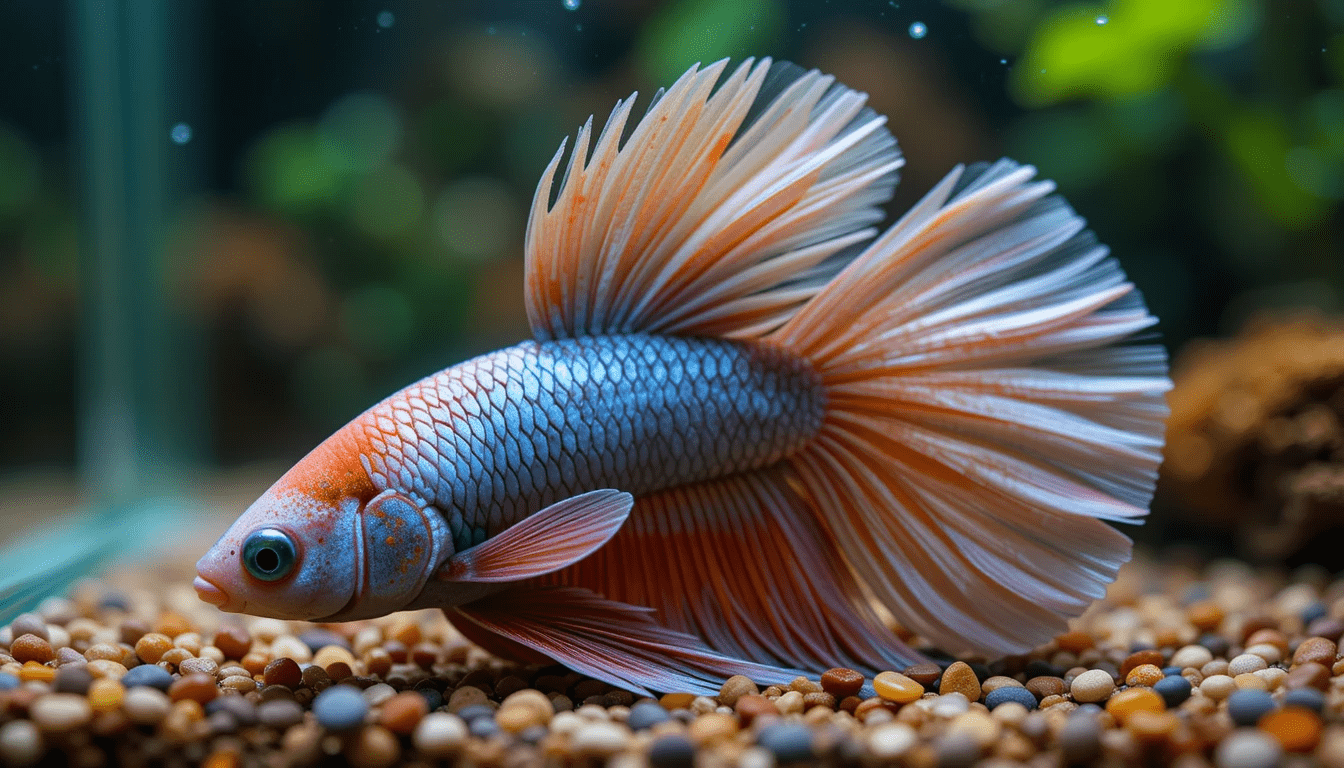As a home aquarium enthusiast, noticing your betta fish lying at the bottom of the tank can be concerning, especially when they are usually lively and healthy. While this behavior may not always be an immediate major concern, it is definitely worth paying attention to. If this behavior is out of the normal realm for your betta splendens, it could be a sign of potential illness, distress, or poor water conditions. In these situations, it’s important to take action to avoid making things worse.
Whether you’ve noticed your betta lying on the bottom or simply wondered what could be the cause of such behavior, this article will provide you with the answer and cover related betta issues to help keep your aquarium in good health.
Some Quick Betta Background
The Betta splendens, also known as the Siamese Fighting Fish, has earned a reputation as an aggressive tropical fish, but this reputation often overshadows their true beauty and potential as pets. Wild bettas were initially discovered in the warm waters of Thailand and eventually found their way into the domestic market around the mid-1920s, coinciding with the rise of hobby aquariums.
While bettas are often lively and healthy, they can also show behavior that might be misunderstood as aggression, which leads many aquarium enthusiasts to think of them only in terms of fighting. It’s important to realize that, although bettas are known for their bold behavior, they can also be peaceful and fascinating when properly cared for, particularly when placed in the right tank with appropriate water conditions. As you explore the world of betta fish, understanding their natural habitat and how they transitioned to the home aquarium market will deepen your appreciation for this lively and beautiful species.
Is It Normal For Betta Fish To Lay On The Bottom Of The Tank?
It’s not always typical for betta fish to lay at the bottom of the tank, but this behavior doesn’t automatically signal that something is wrong. As a home aquarium enthusiast, it’s important to consider the conditions of your tank and observe how your betta usually behaves.
If your betta fish is normally lively and energetic, but occasionally sits at the bottom, it may not be a cause for immediate concern. Poor water conditions or changes in the environment could be factors influencing this behavior. By being mindful of these factors, you can avoid jumping to conclusions about your betta’s health and address any issues early on to prevent them from escalating into something worse.
Always pay close attention to any signs of illness or distress in your fish, as early action can make all the difference in maintaining a healthy tank environment.
Sleeping Betta Fish
A common reason you might see your betta fish laying at the bottom of the tank is during sleep. Betta splendens are known to sleep at the bottom of the tank, especially when the lighting is off. As a home aquarium enthusiast, it’s important to observe if this behavior is happening during periods of darkness, as it may simply indicate your betta is resting. If your betta is normally lively during the day but rests at the bottom at night, there’s usually no cause for concern.
However, if you notice this behavior during other times, it could be a sign of illness, distress, or poor water conditions. Always consider the overall health of your betta fish and the conditions in the tank to ensure its well-being. Proper lighting and maintaining a suitable environment can help your betta feel more secure and prevent unnecessary confusion about when it should be sleeping.
Reason Betta Fish Laying On The Bottom of The Tank With Solution
1.Fatigue
Betta fish are active and energetic, requiring plenty of hiding places and spaces to rest in their tank. If the tank is too small or lacks adequate hiding spots, your betta may become tired from constant swimming and lie at the bottom to rest. As a home aquarium enthusiast, ensuring your betta has enough space to move and rest will help maintain its energy levels and overall health.
Solution
To prevent fatigue, place the tank in a quiet area with minimal disturbances. Provide plenty of plants, caves, and hiding spots for your betta to retreat to when it feels threatened. If needed, change the tank’s decor to create a more suitable environment for your fish.
2.Overcrowding
Overcrowding the tank with too many fish or tank mates can stress your betta fish and cause them to display submissive behaviors, such as staying at the bottom of the tank. Betta fish are territorial and can become aggressive, especially towards other male bettas. To ensure your betta is comfortable, it is crucial to provide them with enough space and an appropriate environment.
Solution
If your betta shares the tank with other fish, ensure that the tank is appropriately sized and that the tank mates are compatible. A tank of at least 5 gallons is recommended for a single betta. Remove any aggressive tank mates and add hiding spots and plants to create separate territories within the tank.
Related: Can Betta Fish Live in a Bowl?
3.Betta Fish Illness
If you notice your betta fish laying at the bottom of the tank along with other signs like lethargy, loss of appetite, or unusual swimming behavior, it could be an indication of illness. Common conditions such as fin rot, ich, and Columnaris can cause these symptoms and should not be ignored. As a home aquarium enthusiast, it’s crucial to consider these signs and take immediate action.
Poor water conditions or distress can sometimes exacerbate the problem, making it even more important to monitor your betta closely. In these cases, quarantine your betta fish to prevent the spread of infection to other tank mates, and seek the advice of a veterinarian or experienced fish hobbyist. Treatment may involve medications, water treatment, and possibly isolation to help your betta recover and regain its strength. By acting quickly, you can minimize the effects of the illness and ensure the health of your fish and the tank.
Solution
To address your betta fish’s potential illness, first, quarantine the sick betta in a separate tank to prevent the spread of the disease to other tank mates. Consult with a veterinarian or an experienced fish hobbyist to identify the specific condition affecting your fish. Treatment options may include medications, water treatment, and proper isolation to allow the betta to recover. Ensuring that the tank environment is clean and properly maintained will also support the recovery process.
Related: Betta Fish Diseases: How to Save Your Fish Before It’s Too Late
4.Overheating
Betta fish are tropical fish and thrive in water temperatures between 76-82°F (24-28°C). If the tank water gets too warm, your betta fish may become sluggish and lie at the bottom to cool down. As a home aquarium enthusiast, it’s essential to monitor the water temperature regularly to ensure it stays within the recommended range. Poor water conditions, including high temperatures, can lead to distress in your betta, affecting its behavior. By keeping a close eye on the temperature and using a quality thermometer, you can prevent your fish from becoming stressed or overheated, helping it maintain its health and well-being in the tank.
Solution
To avoid overheating, maintain a consistent water temperature between 76-82°F (24-28°C) using a reliable aquarium heater. Ensure the tank is not placed in direct sunlight or near drafts, as these can cause temperature fluctuations. Regularly check the temperature to keep your betta comfortable and healthy.
Related: The Best Way to Warm Betta Fish Water
5.Water Quality
Water quality plays a vital role in the overall health and behavior of your betta fish. Regular water changes and proper filtration are essential for keeping the tank environment safe. If the water quality is poor, it can lead to illness, distress, and abnormal behavior, such as your betta fish lying at the bottom of the tank. To maintain healthy water conditions, test the water frequently to ensure the levels of ammonia, nitrite, and nitrate are within safe limits. As a home aquarium enthusiast, paying attention to these details will help prevent many potential health problems and promote a thriving, lively environment for your betta fish.
Solution
To maintain optimal water quality, regularly test the water parameters, including temperature, pH, ammonia, nitrites, and nitrates. Keep these levels within the ideal range for betta fish. Perform routine water changes, usually 25-30% of the tank volume, to ensure a stable and healthy environment for your fish.
6.Old Age
As betta fish age, they may become less active and spend more time resting at the bottom of the tank. This is a natural part of the aging process and generally isn’t a cause for concern. However, it remains important to continue providing proper care and maintaining good water quality to ensure your aging betta remains comfortable and healthy.
Solution
While you can’t reverse the effects of aging, continue to provide excellent care by maintaining water quality and ensuring the tank environment is suitable for your betta’s changing needs.
What To Do If Your Betta Fish Is Laying On The Bottom Of The Tank
If your betta fish is laying at the bottom of the tank, first check to see if it is simply sleeping. Betta fish often rest at the bottom during sleep, especially when the lights are off. However, if this behavior persists or is accompanied by other symptoms, it’s important to monitor for any additional signs of illness or distress.
Make note of specifics like changes in behavior, swimming patterns, or appetite. If you’re unsure, consult a qualified source, such as the original breeder, a veterinarian, or the pet store, to help identify any potential issues. If medication is recommended, follow the instructions carefully, ensuring the treatment is carried out all the way to the end for the best chance of recovery
Conclusion
In conclusion, while seeing your betta fish laying at the bottom of the tank may initially cause concern, it is important to assess the situation carefully. It could be a natural behavior like sleeping, or it may indicate issues such as poor water conditions, fatigue, or even illness. By monitoring the tank environment, maintaining water quality, and providing your betta with the appropriate space and hiding spots, you can ensure a healthy and comfortable environment for your fish. If symptoms persist or worsen, seeking advice from a qualified source, such as a veterinarian or experienced fish hobbyist, will help you address any concerns and provide your betta with the best chance of recovery. With attentive care, your betta fish can continue to thrive in its tank.
You may also like:
- Can Betta Fish and Cherry Shrimp Share a Tank?
- Can Snails Live with Bettas?
- Are Betta Fish Compatible with Goldfish?
- Can Betta Fish & Guppies Live Together?
- Mollies and Bettas in One Tank?
- Is It Safe? African Dwarf Frogs & Bettas in the Same Tank
Also read for extra betta care!

